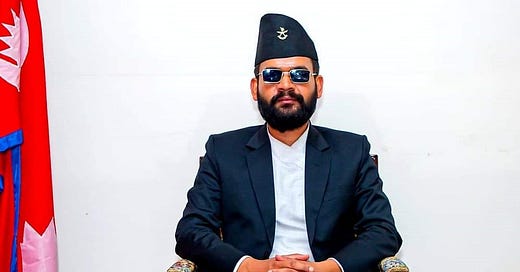Nepal is experiencing a "celebrity politics" wave

In recent years, we’ve seen celebrity campaigns take off in elections around the world. While comedians have made noteworthy appearances in global elections, with one situation potentially unfolding in Venezuela at the moment, the category of “celebrity” encompasses a wide range of figures, the through-line being the varying degrees of built-in name recognition they possess.
Few countries on the planet have seen the impact of this phenomenon like Nepal. In the span of less than a year, the capital of the country, Kathmandu, was taken over by the independent candidacy of a famous hip-hop artist, and a new party led by a TV host is now the fourth largest outfit in national parliament. Taken together, the elections suggest the fraying of an established political order in Nepal, albeit driven by figures who are vague in their approach.
Before rapper Balen Shah was elected mayor, few observers of politics in Nepal believed that his candidacy was serious. He received little or no international media recognition, before or after his win, which now stands out as an example of glaring blindspots for newsrooms looking at the region (or indeed, much of the world). But average citizens were skeptical as well: At times before his upset victory, he was derided as “mayor of social media.” There was a strong assumption his campaign was overhyped, and would inevitably crumble under the weight of political machines that have long dominated Kathmandu politics.
The actual result saw Shah with 38% of the vote, besting his closest opponent by more than 14 points (there was no run-off). His supporters were ecstatic, and questions emerged about the implications for politics nationwide.
Not long after, that speculation found a locus in the form of a new political effort from Rabi Lamichhane, a well-known television host who at one time held the Guiness record for longest-ever talk show episode. Lamichhane quit his television job and launched the “Rastriya Swatantra Party,” aiming at the general election to be held later in the year.
Throughout his career, Lamichhane developed a reputation in Nepal for confrontations with politicians on issues of corruption, with a political bent that some have described as “nationalistic.” His party, however, has been labeled as “ambiguous” in character by the media, home to candidates ranging the political spectrum.
Both Lamichhane and Shah were propelled to victory in strong part thanks to youth, who responded to their social media-oriented campaigns by voting in droves. RSP’s defining characteristic was its deployment of younger candidates. One winning RSP parliamentarian was another talk show host in her 20s.
Likewise, Shah won Nepal’s capital, Kathmandu, while Lamichhane’s biggest victories were mostly in urban areas. Of the seven “constituency” seats won by Lamichhane’s party, all seven were in Bagmati Province, home to both Kathmandu and the second-largest city, Bharatpur.
After the election, Lamichhane was invited to join the new government, a broad coalition including the center-left, several communist parties, and right-wing monarchists, among others. Though Lamichhane was nominated as a minister, he was swiftly disqualified by a legal ruling over his US citizenship and kicked out of parliament. He will return after recently securing a by-election victory bigger than his initial win.
That by-election victory was duplicated when Swarnim Wagle, an economist and defector from the center-left Nepali Congress party, won his race to fill the seat formerly held by Nepal’s president. This was their first constituency win outside of Bagmati, suggesting the party has expanded its reach.
Despite this situation being largely overlooked, the implications for the world might be bigger than they are for Nepal alone. Political machines- the established networks of fundraising, campaigning and support that keep major parties in power- may not be as strong as they once were.
Across the globe, we’ve seen politics-as-usual break down, replaced by social media-savvy insurgents with communities capable of overpowering traditional parties. In Nepal, and elsewhere, celebrities and their ready-made followings seem adeptly positioned to carry that out.
Do you enjoy Populism Updates? Want to keep it going well into the future? Consider “pledging” a few bucks a month to show your support. Pledges will eventually get early editions of articles, including new offerings to come. Everything helps!



